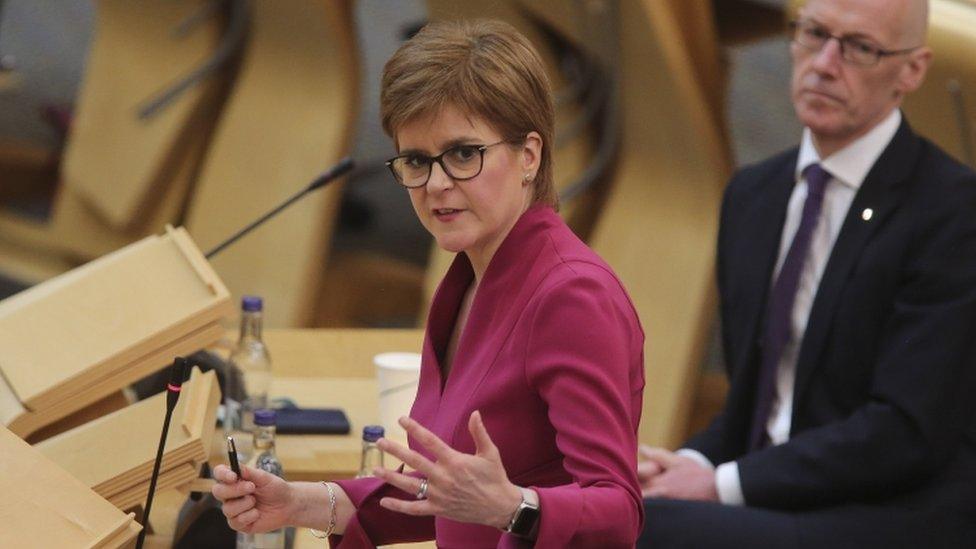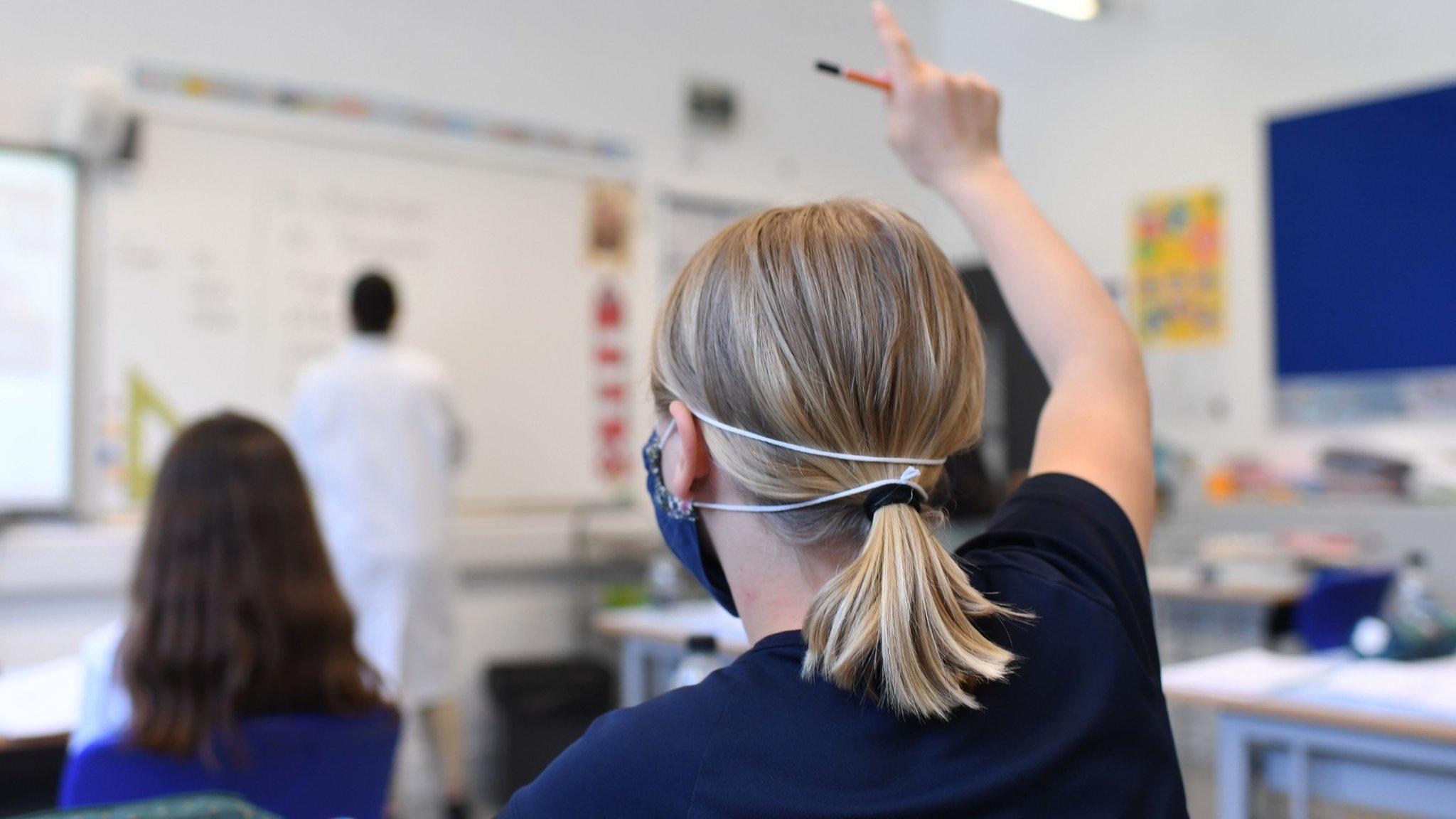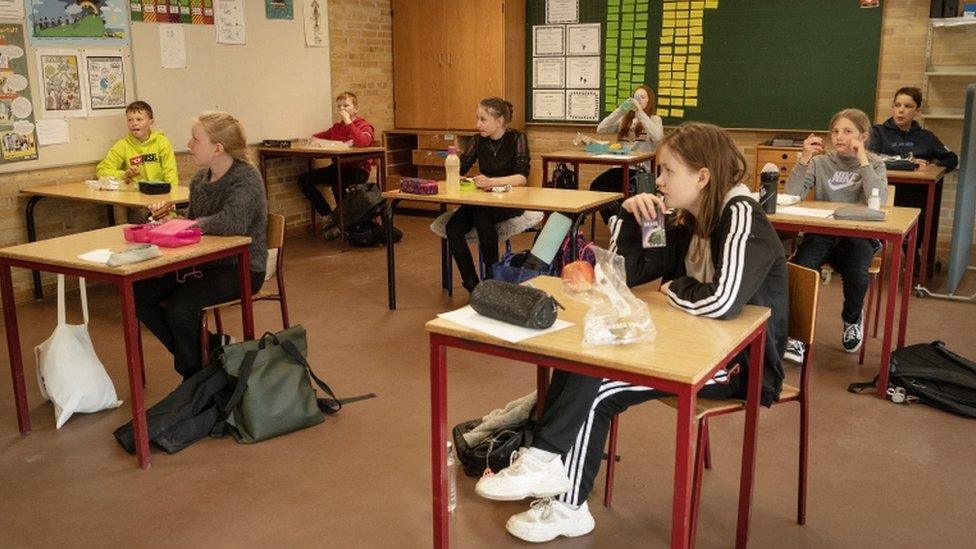Coronavirus: Nicola Sturgeon accused of 'dithering' over school return
- Published

Nicola Sturgeon said her government would "move heaven and earth" to get schools back to normal
Scotland's first minister has been accused of "dithering" over plans to reopen the country's schools.
Pupils are due to return to a "blended" model of schooling from 11 August that will see learning split between home and the classroom.
There have been concerns about the impact of part-time schooling on working parents, and on children from deprived backgrounds.
It is not yet known how long the blended model will be in place.
Plans being drawn up by some councils would have a third of pupils in school at any one time - meaning some pupils could potentially only spend one day a week in class.
The Scottish Conservatives said the government needed to be "far more creative" in finding ways of getting pupils back into school full-time.
And Labour said the government must "pull out all the stops" to tackle a growing "education emergency".
First Minister Nicola Sturgeon said her government would "move heaven and earth" to get schools "back to normal as quickly as possible".
However, she said she would not "act recklessly and put the lives of children, teachers and the wider community at risk".
And she said she expected to announce on Thursday that Scotland can move to the next phase in her "route map" towards lifting the coronavirus lockdown.
Scottish schools are all due to re-open from 11 August, but will not be able to accommodate all pupils at the same time because of social distancing rules.
Some councils have already said this will mean only a third of pupils will be able to attend school at once.
There have been questions over how long the blended model will continue, with Education Secretary John Swinney initially saying it was "unlikely" that schools could return to normal before the end of the coming school year.
Mr Swinney also said that next year's exams could be pushed back.
But Ms Sturgeon later then insisted that it was "absolutely not the case that we are planning for blended learning to last a year or anything like it"

How has home schooling been for you?

Use the form below to tell us about your experience and we could be in touch.
In some cases your experience will be published, displaying your name, age and location as you provide it, unless you state otherwise. Your contact details will never be published. Please ensure you have read the terms and conditions.
If you are reading this page on the BBC News app, you will need to visit the mobile version of the BBC website to submit your question on this topic.

Scottish Conservative leader Jackson Carlaw said parents were looking for "a commitment from ministers to try and get schools back to normal" as quickly as possible.
He said the government "needs to be far more creative" in its plans and be open to radical proposals such as bringing in extra teachers to boost staffing numbers, and to fund councils to turn other buildings into temporary classrooms.
Mr Carlaw went on to accuse Ms Sturgeon of having only offered "soft words matched by a record of non-delivery and months of dithering".
The first minister replied that she would "move heaven and earth" to solve the issue, saying she wanted to get schools and the economy "back to normal as quickly as possible"
However she added: "All of that has to be safe - we cannot have memories so short that we forget we are dealing with a virus that is dangerous and potentially deadly, and it has not gone away.
"We must continue to move forward in a careful and phased way."

Schools in Denmark reopened in April with pupils sitting at least two metres apart
Scottish Labour leader Richard Leonard said the government had offered "nothing but mixed messages" on education, and claimed there had been "chaos" with Ms Sturgeon contradicting the education secretary and her advisors.
He said the government must offer councils additional resources to tackle the "education emergency", adding: "We need to pull out all the stops to make sure our children return to school safely as soon as possible."
Unions have said more funding will have to be made available if extra teachers are to be taken on and temporary classrooms set up.
Ms Sturgeon said her government was tackling a health emergency, an economic emergency and a schools emergency simultaneously, and that "we cannot play fast and loose with the safety of children".
She said councils had been given extra resources and that the government would work with them to see how plans for blended learning could be enhanced.
Meanwhile, Scottish Lib Dem leader Willie Rennie said the government had "put parents in an impossible position" by asking them to go back to work while still having to home-school their children.
Ms Sturgeon replied that "it's a global health pandemic that's putting people in an impossible position", but stressed that she recognised things were "incredibly difficult" for teachers and parents.
Allow X content?
This article contains content provided by X. We ask for your permission before anything is loaded, as they may be using cookies and other technologies. You may want to read X’s cookie policy, external and privacy policy, external before accepting. To view this content choose ‘accept and continue’.
On Tuesday, Devi Sridhar - the chair of global public health at the University of Edinburgh and part of the government's Covid-19 advisory team - told BBC Scotland that she could "see right now no reason" why schools could not return full-time in August if coronavirus is suppressed and other precautions are put in place.
She had earlier posted on Twitter her "personal view" that "schools should re-open as normally as possible" if case numbers are low enough, prompting Ms Sturgeon to agree that "nearer normality may be possible".
Ms Sridhar said she would "love to see local level data" about different parts of Scotland, saying that if there were no new cases in some areas "I'd be pretty confident saying schools could go back if precautions are in place".
She added: "We should always plan for blended learning, you should always plan as there is a lot of unpredictability with this virus - but there is light at the end of the tunnel.
"The past weeks of lockdown has put us in a good position, and I see Scotland more like a place like Denmark and Norway - the better performing countries."
Ms Sridhar also dismissed suggestions she had been pressured, external into changing her position by ministers, saying: "What I say here is what I think based on the data and on learning from other countries - I've spoken out against policies I think are wrong and spoken for policies I think are right."

RISK AT WORK: How exposed is your job?
SCHOOLS: When will children be returning?
EXERCISE: What are the guidelines on getting out?
THE R NUMBER: What it means and why it matters
RECOVERY: How long does it take to get better?
